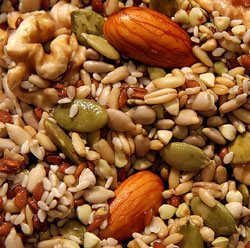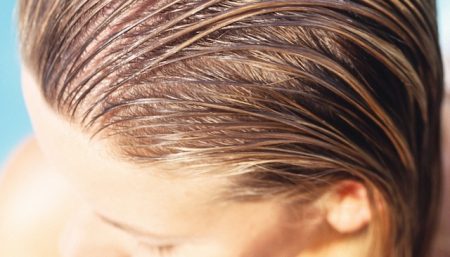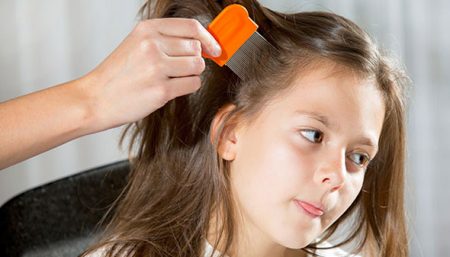Monsoons are not really a friend for your tresses. Constant drenching in the monsoon and high levels of humidity spell bad news for your mane. There is quite a possibility that you might fall prey to a number of scalp problems and bad hair days during the rainy season. Diligent hair care is needed to maintain the heath and good looks of your locks.

Certain scalp diseases become more prevalent in the monsoon — exposure to rainwater and consequent warm, humid conditions encourage the growth of bacteria and fungi on the scalp. Painful pus-filled boils due to bacterial infections are fairly common in this season, not to mention severely itchy, flaking patches of fungal infection, which result in hair loss in the affected area.
Lice infestation is also way too common in the rains; lice breed during this season. And what’s more, such infestations are not just a poor man’s problem — well-to-do, hygiene-conscious people can also be easily infected.
For some, dandruff worsens as the fungus responsible for causing it flourishes in humid weather. Non-specific itchiness of the scalp and irritation are also common.
Looking for Remedies:
 To prevent these problems, frequent shampooing and keeping your hair dry as far as possible is a must in the monsoons. Contrary to popular belief, frequent washing does not lead to hair loss — you can even wash your hair daily with a mild shampoo if your hair is exposed to rain every day. Magnolia blossoms & watercress extracts are good for those with dry hair, who would need a moisturizing quotient in their shampoos, to prevent the hair from becoming frizzy during monsoons. Oily hair tends to become limp during monsoons & requires shampoos that will give volume to the hair. Natural extracts like rosemary and sage can give that extra bounce and vitality to limp hair.
To prevent these problems, frequent shampooing and keeping your hair dry as far as possible is a must in the monsoons. Contrary to popular belief, frequent washing does not lead to hair loss — you can even wash your hair daily with a mild shampoo if your hair is exposed to rain every day. Magnolia blossoms & watercress extracts are good for those with dry hair, who would need a moisturizing quotient in their shampoos, to prevent the hair from becoming frizzy during monsoons. Oily hair tends to become limp during monsoons & requires shampoos that will give volume to the hair. Natural extracts like rosemary and sage can give that extra bounce and vitality to limp hair.
For boils on the scalp try Betadine AD shampoo twice a week; for fungal infections and dandruff you can try ketoconazole-based shampoos like Nizral, KZ etc. For lice, apply Perlice, leave on for a couple of hours and wash off. If the problem is not resolved in a few days or become very severe, please do consult a dermatologist immediately.
Avoid brushing wet hair as it tends to break very easily. Towel dry hair after a wash and then, if you must, run a wide-toothed comb gently through your hair. Don’t use a brush. Also, don’t tie your hair up when it’s wet. Let it dry completely first.
You must also dry your hair after shampooing thoroughly. Use a hair dryer with a diffuser attached and keep it six to eight inches away from your hair to avoid singeing/ burning. If you’re caught unawares in a rain shower and don’t have a hair dryer flip your hair under the hand dryer in the bathroom and run your fingers through it till dry.
Conditioning is very important in the monsoon as excess humidity in the environment tends to frizz your hair. A good conditioner neutralizes this frizzing and smoothens out the hair, making it manageable. Severe frizziness in curled or permed hair can be tackled with anti-frizz serums available in the market (TIGI, Schwarzkopf etc). If you’re planning to colour your hair or perm it, it’s advisable to wait till the rains are over as such treatments don’t always give their best results in highly humid conditions. Extracts like Avocado Oil and Burdock in conditioners will give the hair a silky smooth feel and also help prevent hair fall.
manageable. Severe frizziness in curled or permed hair can be tackled with anti-frizz serums available in the market (TIGI, Schwarzkopf etc). If you’re planning to colour your hair or perm it, it’s advisable to wait till the rains are over as such treatments don’t always give their best results in highly humid conditions. Extracts like Avocado Oil and Burdock in conditioners will give the hair a silky smooth feel and also help prevent hair fall.
Keep your nourishment levels up with a high protein diet and plenty of whole grains and nuts, which are rich in biotin (the vitamin that helps hair growth). You can also try protein-rich hair packs. Blend an egg white, olive oil, soaked and crushed Fenugreek (methi) seeds and yoghurt and coat sections of your hair with it using a pack brush. Leave on for half an hour and shampoo out thoroughly with lukewarm water. Severe hair loss or breakage should be tackled by a dermatologist to determine the exact cause and to institute effective treatment for the same.
Here’s the golden rule for healthy hair in the monsoons — keep hairstyles short and simple and your scalp clean and dry.
Disclaimer
The Content is not intended to be a substitute for professional medical advice, diagnosis, or treatment. Always seek the advice of your physician or other qualified health provider with any questions you may have regarding a medical condition.


